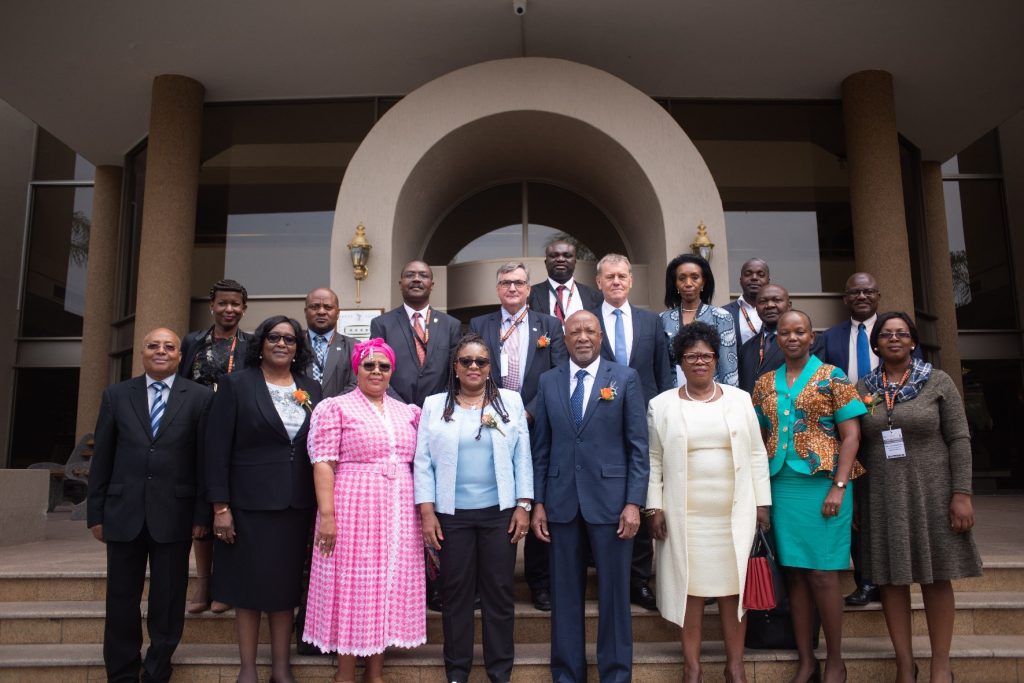
His Excellency, the Vice President / Acting President of the Republic of Namibia, Dr Nangolo Mbumba (front row, fourth from right), Ministerial delegation, SASSCAL Governing Board Members, SASSCAL Executive Director and WASCAL Governing Board Chairman.
The SASSCAL Ministerial Meeting, which was held on Friday 21 September in Windhoek, was officially opened by His Excellency, the Vice President / Acting President of the Republic of Namibia, Dr Nangolo Mbumba. In his opening speech, Dr Mbumba acknowledged that SASSCAL’s second phase and transformation into an international organisation will require political support, strong commitment and policy guidance of lead Ministers from its member states, the governing board as well as Germany. “Namibia remains ready to continue carrying out the mandate of ensuring that the Southern African region will always address climate change with effective evidence-based scientific solutions”. SASSCAL strategic positioning as a “regional scientific advisory, information service and adaptive land management centre” enables it to provide products and services for policy makers. He further highlighted that SASSCAL’s initiative is most opportune, as it generates the scientific knowledge techniques and skills that are required to minimize and mitigate the impacts of climate change in the region.
Dr Mbumba applauded SASSCAL’s prudent regional approach to addressing the effects of climate change. SASSCAL was formed in support of the UNFCCC, Bali action plan, which supports global initiatives that are aimed at addressing challenges related to climate change. The region has, for the past few years, witnessed devastating effects of climate change, in the form of prolonged drought spells. The agricultural sector forms a significant portion of the economies of all African countries as most countries are heavily reliant on either subsistence or commercial farming. Southern Africa, in particular, is heavily dependent on rain fed agriculture for the majority of its population, especially rural communities. The majority of the African populations’ workforce is in the agronomic and livestock sectors. Given the reliance of the majority of Africa’s populations on climate sensitive sectors, the potential impact of climate change could be catastrophic to Africa’s population, added Dr Mbumba.
Ironically, the African continent, which is the least contributor to greenhouse gas emissions, is projected as the most vulnerable continent to carry the heaviest brunt of climate change, stated Dr Mbumba. The continent has already experienced temperature increase of approximately 0.7 Degrees Celsius within the 20th century with climate change projection models indicating more temperature increases and rainfall variations. Climate change is already contributing to decreases in food production, loss of biodiversity and changes in natural ecosystem services. Thus, Dr Mbumba called on other member states to re-dedicate and intensify efforts to achieve UN Sustainable development goal 13 ,which is to ‘Take urgent action to combat climate change and its impacts’.
SASSCAL is well positioned to provide scientifically backed information to inform policies, geared at combating climate change. Through its research component, SASSCAL produces knowledge-based services and product that can facilitate the urgent action required to combat climate change. SASSCAL through its recently concluded research portfolio, has strengthened the region’s infrastructure and human capacity to better respond to climate change impacts through adaptive land management, among others.
SASSCAL Marketing and Communications
Enquiries: greater.mukumbira@sasscal.org




